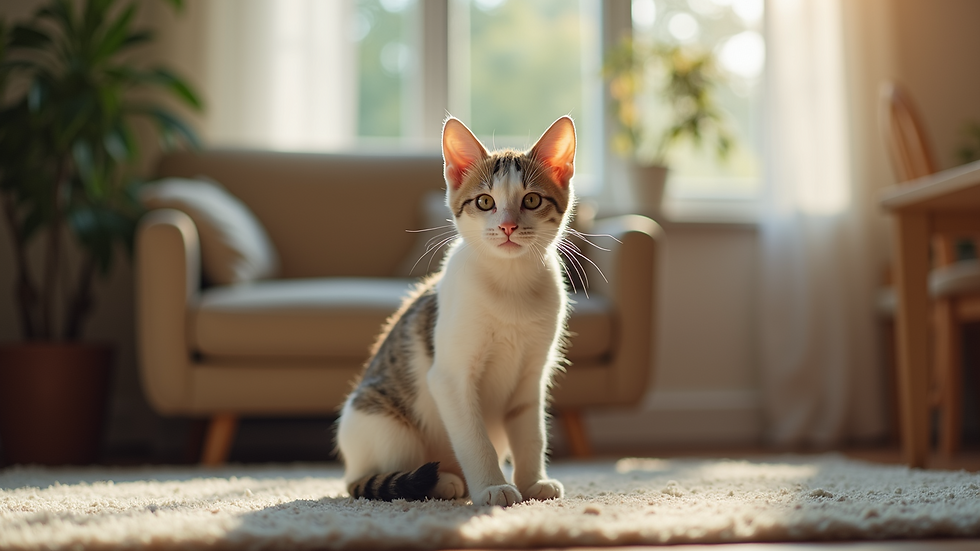Why Pet Sitting May Be the Ideal Choice Over Boarding for Your Furry Friend
- Aug 21, 2025
- 3 min read
As pets become beloved members of our families, ensuring their well-being during trips or extended absences takes priority for many pet owners. With various care options available, pet sitting has emerged as a preferred choice for many. In this blog post, we will explore why pet sitting may be the ideal alternative to traditional boarding, especially for specific types of pets.
Understanding the Stress Factor
One major concern for pets in boarding facilities is stress. A boarding facility can feel overwhelming for animals used to the comforts of home. A study found that nearly 70% of pets exhibited signs of anxiety when separated from their owners in unfamiliar environments. Changes in routine and interactions with unfamiliar animals can heighten this anxiety.
In contrast, pet sitting allows animals to stay in their familiar surroundings, greatly reducing anxiety and stress. For instance, if your pet is accustomed to napping in a specific spot or enjoying a favorite toy, a pet sitter can ensure these comforts remain in place. This sense of stability contributes positively to your pet’s happiness and well-being during your absence.
Personal Attention and Care
Another significant advantage of pet sitting is the personalized attention and care your furry friend receives. Unlike boarding facilities, where pets are often housed in groups and may receive limited individualized attention, pet sitters offer one-on-one care tailored to each pet's needs.
This focused interaction can boost your pet's emotional health. For example, if your dog enjoys playing fetch, the sitter can dedicate time to this activity, reinforcing your pet’s sense of security. One-on-one time helps build a bond, making a noticeable difference in your pet's comfort and happiness.

Maintaining Routine and Diet
For pets, consistency in routine is crucial. Sudden disruptions can lead to stress or digestive issues. Boarding can disrupt established feeding schedules and exercise routines. A pet sitter ensures your pet follows their regular diet and schedule, giving them a sense of normalcy.
Consider that pets thrive when their feeding and walking schedules remain unchanged. By maintaining these routines, pet sitters not only help in preventing digestive problems but also reduce the likelihood of behavioral changes associated with sudden shifts in routine.
Healthier Environment for Your Pet
For pets with specific health issues or young animals needing extra attention, pet sitting can be advantageous compared to boarding. Shared spaces in boarding facilities can increase exposure to illnesses or parasites.
With pet sitting, your pets can stay in a hygienic, familiar environment, significantly lowering the risk of infectious diseases. For instance, older pets or those with compromised immune systems benefit greatly from the lowered exposure to outdoor pathogens, creating a safer experience.

Convenience for Pet Owners
For pet owners, pet sitting offers unmatched convenience. Many sitters provide services such as feeding, walking, administering medications, and even simple household chores like watering plants or collecting mail. In fact, over 80% of pet sitters offer comprehensive care packages that cater to varying needs.
This convenience allows pet parents to travel with peace of mind, knowing their pets are cared for without being relocated. Furthermore, many pet sitters are flexible, easily accommodating last-minute trips or changes in plans.
Socialization Opportunities
Despite common misconceptions, pet sitting can promote social skills, particularly for dogs. A skilled pet sitter will engage with your pet, take them on walks, and potentially arrange playdates with other pets.
This engagement allows for socialization in a controlled environment, providing valuable mental stimulation. For dogs, social interactions can help curb behavioral issues associated with boredom or loneliness, keeping them happy and healthy.

Safety and Security
When it comes to safety, pet sitting holds a clear advantage over boarding. In a boarding facility, pets might interact with various other animals, which can sometimes lead to accidents or conflicts.
With a pet sitter, your pet is in a safe, secure environment. They are closely monitored by someone familiar with their unique temperament, which reduces the chance of incidents and ensures your pet remains comfortable and secure.
Final Thoughts
In conclusion, pet sitting can be an ideal alternative to boarding for many pets, especially those that experience anxiety, require specific routines, or thrive in familiar environments. The personal attention, reduced stress, and focus on maintaining established routines offer distinct benefits that enhance a pet's well-being.
For pet parents who prioritize their pets’ comfort and happiness, choosing pet sitting allows for peace of mind, knowing that their furry friends are cared for with love and attention while they are away.

©Philly’s Paws & Claws LLC.




Comments